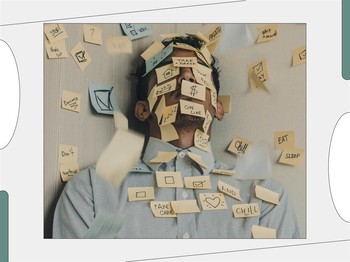Workplace anxiety is different from experiencing anxiety at work. Workplace anxiety involves feeling stressed, nervous, uneasy, or tense about work, which could include anxiety about job performance, interactions with co-workers, receiving calls or emails, down to public speaking. Meanwhile, anxiety disorder tends to develop and persist, regardless of your work circumstances and it negatively affects several aspects of your life.
While a little bit of work-related stress is normal, excessive anxiety may negatively affect your overall health and well-being and cause problems both in your personal and professional life if you're not able to address it. When you are at work a place where one is expected to perform and be at their best it can be difficult to admit to vulnerabilities and cut yourself some slack. In fact, a survey reports that 38% of those experiencing workplace anxiety don't tell their colleagues because they have a fear that their boss would interpret it as lack of interest or unwillingness to do the activity or task.
Workplace anxiety may lead to several problems at work such as inability to focus, failure to meet deadlines, forgetfulness, fatigue, and an upset stomach. According to Very Well Mind, workplace anxiety may be caused by something directly related to your job such as having interpersonal conflicts with your co-workers, lack of job security, facing deadlines that are too short, difficult daily tasks, and fast-paced and competitive work environment. However, it may also occur because of individual characteristics or certain circumstances. For example, when you are distracted by other concerns, lack the knowledge or skills for your job, have no motivation to achieve goals at work, a mental health condition, and have difficulty understanding and managing your emotions.
Here are some things you can do to handle your workplace anxiety.
Speak to your manager or co-workers
Not everyone includes this in the option, but speaking to your supervisor about your anxiety may help. They may be able to offer you accommodations to help you do your job more effectively. If you don't have the courage to tell your supervisor, then try telling a co-worker who you trust your feelings to. Having someone at work who knows what you're going through may help you feel more socially supported, which could lower your stress levels.
Work within your limits
Boundaries are important. You need to know your limits and learn how to work with them. This can come in the form of prioritizing your task, focusing on a single task at a time and trying to not think about all of the things left that needs to be done, or setting small but frequent deadlines to keep yourself on track.
Apply quick coping strategies
Taking a timeout to clear your head before the anxiety gets worse is something you can do at work such as going outside for a few minutes, listening to calming music, practicing breathing exercises, watching funny videos, chatting with a colleague, and more. Grounding is another method that can help positively shift your attention in the moment, such as holding on to a hot cup of tea or a cold glass of water, noticing specific things you can see in your surroundings, smelling a candle, perfume, or essentials oil, and tasting food with strong flavor such as lemon or lime.






























